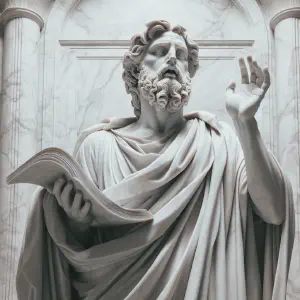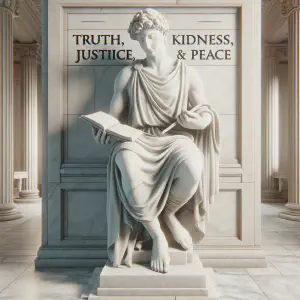The Dawn of Salvation
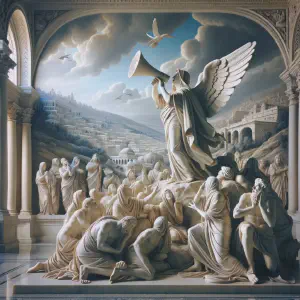
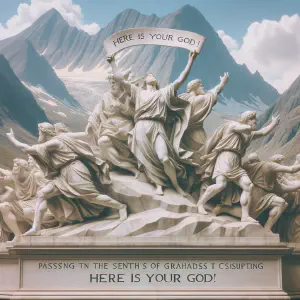
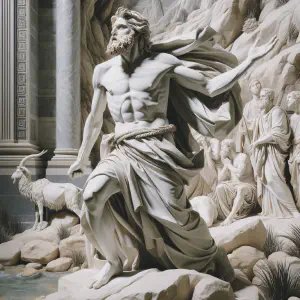
Amidst these declarations of hope and salvation, John the Baptist emerged in the wilderness, a pivotal figure in this unfolding divine narrative. Clad in camel’s hair and a leather belt, his ascetic presence was a stark contrast to the world around him. He called for repentance, baptizing in the Jordan River, preparing the way for someone greater than himself. His message was clear: the one who would baptize with the Holy Spirit was coming. This anticipation of the Messiah, the one who would fulfill all these prophecies and hopes, marked the beginning of a new era – the dawn of salvation.
Five Questions
How does the imagery of comfort and redemption in Isaiah 40 relate to the overall theme of the story?
The imagery in Isaiah 40 is foundational to the story’s theme. It speaks of comfort and redemption, symbolizing God’s promise to restore and heal His people. This prophecy sets the stage for the coming of the Messiah, linking to the story’s central theme of salvation. It’s about preparing the way for the Lord, both physically and spiritually, highlighting God’s intention to lift the burdens of His people and usher in an era of spiritual renewal.
What significance does the role of John the Baptist in Mark 1 hold in this narrative?
John the Baptist is pivotal in this narrative as he embodies the bridge between prophecy and fulfillment. In Mark 1, he is the voice crying out in the wilderness, making straight the path for the Lord. His role signifies the transition from the Old Testament prophecies to their realization in the New Testament. John’s call for repentance and baptism for the forgiveness of sins directly ties to the theme of preparing oneself for the coming of the Messiah, emphasizing the need for spiritual readiness.
How do the concepts of justice, peace, and righteousness in Psalm 85 enhance the understanding of this story?
Psalm 85 beautifully complements the story by weaving in themes of justice, peace, and righteousness. These concepts are crucial as they reflect the qualities of the coming kingdom of God. The psalm talks about kindness and truth meeting, justice and peace kissing – metaphors that portray a harmonious world under God’s reign. This alignment of divine attributes with earthly realities offers a deeper understanding of the kind of salvation and transformation the Messiah is expected to bring.
Can you explain the significance of the ’new heavens and a new earth’ as mentioned in 2 Peter 3?
2 Peter 3 introduces the concept of ’new heavens and a new earth,’ which is significant as it symbolizes the ultimate fulfillment of God’s promises. This idea represents the complete transformation and renewal of the current world order. It’s a promise of a future where righteousness dwells, free from sin and corruption. This aligns with the story’s theme of redemption and hope, assuring believers that God’s plan includes not just the redemption of individuals but the entire creation.
What lessons can modern-day Christians draw from these scriptures in terms of living out their faith?
Modern-day Christians can draw several lessons from these scriptures. First, like John the Baptist, believers are called to prepare the way for the Lord in their hearts and communities through repentance and humble service. The imagery of comfort and redemption reminds Christians of God’s constant presence and mercy in their struggles. The harmonious coexistence of justice, peace, and righteousness in Psalm 85 encourages Christians to strive for these qualities in their lives. Lastly, the anticipation of a new heaven and earth provides hope and a perspective that transcends current challenges, motivating believers to live in holiness and peace as they await the fulfillment of God’s promises.
Bible Study
Isaiah 40:1-5, 9-11
Comfort, give comfort to my people,
says your God.
Speak tenderly to Jerusalem, and proclaim to her
that her service is at an end,
her guilt is expiated;
indeed, she has received from the hand of the LORD
double for all her sins.
A voice cries out:
In the desert prepare the way of the LORD!
Make straight in the wasteland a highway for our God!
Every valley shall be filled in,
every mountain and hill shall be made low;
the rugged land shall be made a plain,
the rough country, a broad valley.
Then the glory of the LORD shall be revealed,
and all people shall see it together;
for the mouth of the LORD has spoken.
Go up on to a high mountain,
Zion, herald of glad tidings;
cry out at the top of your voice,
Jerusalem, herald of good news!
Fear not to cry out
and say to the cities of Judah:
Here is your God!
Here comes with power
the Lord GOD,
who rules by his strong arm;
here is his reward with him,
his recompense before him.
Like a shepherd he feeds his flock;
in his arms he gathers the lambs,
carrying them in his bosom,
and leading the ewes with care.
Isaiah, a major prophet in the Old Testament, speaks to the Israelites in exile, offering God’s comfort and promise of redemption. His role is to convey God’s messages, often centering on hope amidst suffering. This passage aligns with Catholic values of God’s mercy and forgiveness, as seen in the sacrament of reconciliation. It also reflects the belief in God’s providential care, akin to the Divine Shepherd in the passage, resonating with Jesus’ portrayal in the New Testament.
Psalm 85:9-14
R. (8) Lord, let us see your kindness, and grant us your salvation.
I will hear what God proclaims;
the LORD—for he proclaims peace to his people.
Near indeed is his salvation to those who fear him,
glory dwelling in our land.
R. Lord, let us see your kindness, and grant us your salvation.
Kindness and truth shall meet;
justice and peace shall kiss.
Truth shall spring out of the earth,
and justice shall look down from heaven.
R. Lord, let us see your kindness, and grant us your salvation.
The LORD himself will give his benefits;
our land shall yield its increase.
Justice shall walk before him,
and prepare the way of his steps.
R. Lord, let us see your kindness, and grant us your salvation.
This psalm, a poetic expression of faith, reflects Israel’s hope for God’s salvation and peace. The psalmist, traditionally King David, plays the role of an intercessor, expressing the communal yearning for God’s truth and mercy. The convergence of kindness, truth, justice, and peace in this Psalm aligns with Catholic teachings on social justice and the inherent dignity of human life. It echoes Catholic values of peace and reconciliation, and the anticipation of God’s kingdom.
2 Peter 3:8-14
Do not ignore this one fact, beloved,
that with the Lord one day is like a thousand years
and a thousand years like one day.
The Lord does not delay his promise, as some regard “delay,”
but he is patient with you,
not wishing that any should perish
but that all should come to repentance.
But the day of the Lord will come like a thief,
and then the heavens will pass away with a mighty roar
and the elements will be dissolved by fire,
and the earth and everything done on it will be found out.
Since everything is to be dissolved in this way,
what sort of persons ought you to be,
conducting yourselves in holiness and devotion,
waiting for and hastening the coming of the day of God,
because of which the heavens will be dissolved in flames
and the elements melted by fire.
But according to his promise
we await new heavens and a new earth
in which righteousness dwells.
Therefore, beloved, since you await these things,
be eager to be found without spot or blemish before him, at peace.
Attributed to Saint Peter, the apostle and first Pope, this epistle addresses early Christians. Peter’s role is pastoral, guiding and encouraging the faithful in times of uncertainty. This passage’s emphasis on patience and the anticipation of a new heaven and earth aligns with Catholic teachings on eschatology and the ultimate fulfillment of God’s plan. It also reflects Catholic values of living a holy life, echoing the Beatitudes, and the call to be ‘without spot or blemish’ resonates with the pursuit of sanctifying grace.
Mark 1:1-8
The beginning of the gospel of Jesus Christ the Son of God.
As it is written in Isaiah the prophet:
Behold, I am sending my messenger ahead of you;
he will prepare your way.
A voice of one crying out in the desert:
“Prepare the way of the Lord,
make straight his paths.”
John the Baptist appeared in the desert
proclaiming a baptism of repentance for the forgiveness of sins.
People of the whole Judean countryside
and all the inhabitants of Jerusalem
were going out to him
and were being baptized by him in the Jordan River
as they acknowledged their sins.
John was clothed in camel’s hair,
with a leather belt around his waist.
He fed on locusts and wild honey.
And this is what he proclaimed:
“One mightier than I is coming after me.
I am not worthy to stoop and loosen the thongs of his sandals.
I have baptized you with water;
he will baptize you with the Holy Spirit.”
This passage introduces John the Baptist, a key figure in preparing for Jesus’ ministry. John, a prophet and Jesus’ relative, embodies humility and repentance, calling for baptism as a symbol of cleansing from sin. His role in announcing the coming Messiah aligns with Catholic teachings on preparation for receiving Christ, particularly during Advent. This passage underscores the importance of repentance, a key aspect of Catholic morality and the sacrament of reconciliation, and anticipates the sacramental life in the Church, particularly Baptism and the Holy Spirit’s role.
Lessons
The passages collectively teach us about the enduring mercy and love of God towards humanity. Isaiah speaks of comfort and preparation for the Lord’s coming, emphasizing God’s role as a shepherd and redeemer. The Psalm reflects on the harmony of God’s truth and kindness, reminding us that His salvation is near to those who fear Him. Peter encourages believers to live in holiness and peace, awaiting the promised new creation. Finally, Mark introduces John the Baptist, who prepares the way for Christ, teaching us the importance of repentance and humility in receiving the Holy Spirit. These scriptures collectively guide us to anticipate the Lord’s coming with hope, preparing our hearts through repentance and trust in God’s merciful love.
Meditation Prayer
